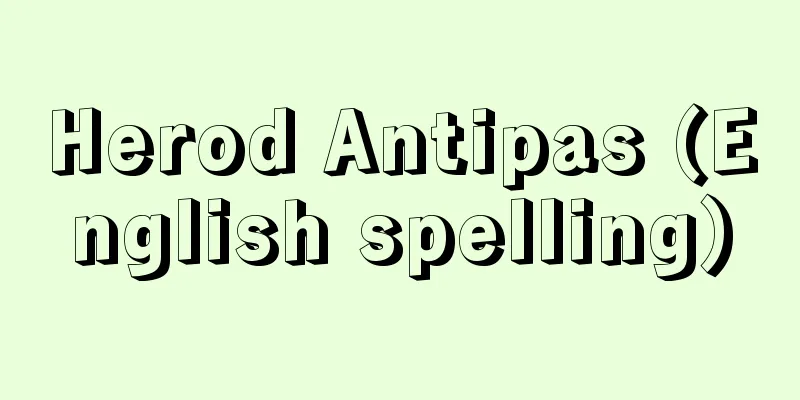Pardon - Onsha

|
The extinction of all or part of the state's specific criminal power without judicial procedures. Under the Constitution of the Empire of Japan, pardons were the prerogative of the Emperor, but under the current Constitution, pardons are decided by the Cabinet and certified by the Emperor (Article 73, item 7, and Article 7, item 6). The types and contents of pardons are stipulated in the Amnesty Law of 1947 (Law No. 20 of 1947). According to this law, there are five types of pardons: general amnesty, special amnesty, commutation of sentence, exemption from execution of sentence, and restoration of rights. [Tetsuro Nawa] amnestyIt is a general extinction of the right to punish crimes specified by government ordinance, and is not limited to specific individuals. Among these, there are (1) cases in which the effect of a guilty verdict is extinguished for those who have been found guilty, and (2) cases in which the right to prosecute is extinguished for those who have not been found guilty (Article 3 of the Amnesty Law). [Tetsuro Nawa] amnestyIt nullifies the effect of a guilty sentence for a specific person who has been convicted. Whether it is a general or special amnesty, if the effect of a guilty sentence is nullified, the prisoner will be released, and those on suspended sentences will have the same effect as if the suspended sentence had expired. [Tetsuro Nawa] Commutation of sentenceThis refers to a general reduction in the sentence for a person who has been sentenced, specifying the type of crime or punishment by government ordinance (general reduction in sentence), and a reduction in the sentence or reduction in the execution of the sentence for a specific person who has been sentenced (special reduction in sentence). However, for those who are on a suspended sentence, there are cases where the sentence is merely reduced, and cases where the suspended sentence period is shortened in addition to the reduction. [Tetsuro Nawa] Exemption from execution of sentenceThis is done for a specific person who has been sentenced. However, it cannot be done for a person who is currently on a suspended sentence. It is different from a pardon where no sentence is imposed. In addition to being done as a type of pardon, it is a pardon for a sentence that has expired under the Criminal Code (Article 31 of the Criminal Code). [Tetsuro Nawa] RestorationThere are general restoration of rights and special restoration of rights. General restoration of rights refers to the general restoration of rights to those who have been found guilty and lost or had certain qualifications suspended under law, by setting conditions by government ordinance. Special restoration of rights refers to cases where restoration of rights is granted individually to specific individuals. In addition to restoration of rights as a type of amnesty, there is also legal restoration of rights under the current Criminal Code. Although pardons can fulfill certain functions such as removing the problems associated with uniform application of the law, providing relief for wrongful convictions, and satisfying criminal policy needs, it must be borne in mind that because they involve the executive branch modifying judicial decisions, there is a risk of them being abused for political purposes. [Tetsuro Nawa] [Reference] |Source: Shogakukan Encyclopedia Nipponica About Encyclopedia Nipponica Information | Legend |
|
司法手続によることなく、国家の具体的な刑罰権の全部または一部を消滅させること。大日本帝国憲法のもとで恩赦は天皇大権に属していたが、現行憲法は、内閣が決定し、天皇が認証することにした(憲法73条7号、7条6号)。恩赦の種類・内容については、1947年の恩赦法(昭和22年法律第20号)に定められている。同法によれば、恩赦には、大赦、特赦、減刑、刑の執行の免除、および復権の5種がある。 [名和鐵郎] 大赦政令により特定された犯罪につき刑罰権を一般的に消滅させることであり、対象が特定人に限られることはない。このなかにも、(1)有罪の言渡しを受けた者につきその言渡しの効力を消滅させる場合と、(2)有罪の言渡しを受けない者につき公訴権を消滅させる場合とがある(恩赦法3条)。 [名和鐵郎] 特赦有罪の言渡しを受けた特定の者に対して、有罪の言渡しの効力を失わせるものである。大赦、特赦のいずれの場合にも、有罪言渡しの効力が失われれば、受刑者は釈放され、執行猶予中の者は猶予期間満了と同じ効果を得ることとなる。 [名和鐵郎] 減刑刑の言渡しを受けた者に対し、政令により罪または刑の種類を定めて一般的に刑を減軽すること(一般減刑)、および刑の言渡しを受けた特定の者に対し刑を減軽するか、刑の執行を減軽すること(特別減刑)をいう。ただ、刑の執行猶予期間中の者については、刑を減軽するにすぎない場合と、この減軽に加えて執行猶予期間をも短縮することもできる。 [名和鐵郎] 刑の執行の免除刑の言渡しを受けた特定の者に対しこれを行う。ただし、刑の執行猶予期間中の者に対してはこれを行うことはできない。刑を言い渡さない刑の免除とは異なる。なお、恩赦の一種として行われるほかに、刑法上刑の時効が完成したときその執行が免除される(刑法31条)。 [名和鐵郎] 復権一般復権と特別復権がある。一般復権とは、有罪の言渡しを受け法令により一定の資格を喪失したり、これを停止された者に対し、政令で要件を定めて一般的に資格を回復することをいう。特別復権とは、特定の者に対して個別的に復権を認める場合である。なお、恩赦の一種としての復権のほかに、現行刑法にも法律上の復権がある。 恩赦は、法の画一的な適用に伴う弊害の除去、誤判の救済、刑事政策的な必要性などに関し一定の機能を果たしうるが、行政府により司法判断を修正するものであるから、政治的に濫用される危険性があることに留意しなければならない。 [名和鐵郎] [参照項目] |出典 小学館 日本大百科全書(ニッポニカ)日本大百科全書(ニッポニカ)について 情報 | 凡例 |
>>: Greenhouse plants - greenhouse plants
Recommend
Alcyoniidae
...A general term for coelenterates (Cnidarians) ...
Learned taste refusal behavior
…This is innate and occurs even in infants. After...
The Italian Economic Miracle
…Official name: Italian RepublicRepubblica Italia...
White oil
…It is a highly refined dewaxed oil with a relati...
Arno Holz
German author. Born in Rastenburg (now Kętrzyn, P...
Gully
…Furthermore, valley head erosion also occurs, an...
Ninos
...She was the daughter of the Syrian goddess Der...
Reclams Universal-Bibliothek
The German "Reclam Encyclopedia" is a s...
Silver oxide battery
This button-type alkaline primary battery uses mo...
Rock and roll
...It is a white version of black rhythm and blue...
Atlas (Saturn)
…However, Voyager discovered or confirmed many mo...
Reference person - sankounin
A witness is a person other than a suspect, such ...
Youngerman, J.
...The former include R. Rauschenberg, J. Jones, ...
Borden, Robert Laird
Born June 26, 1854 in Grand Pres, Nova Scotia [Die...
Courtship behavior
This refers to various behaviors exchanged betwee...



![Takikawa [city] - Takikawa](/upload/images/67cc1ec183fbc.webp)



![Esashi [city] - Esashi](/upload/images/67cb0625a4011.webp)

